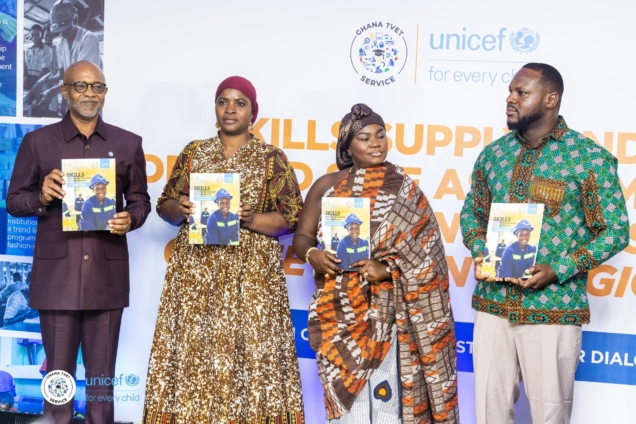UNICEF Ghana, in collaboration with the Ghana Technical and Vocational Education and Training (TVET) Service, has released a major study revealing significant mismatches between the skills currently taught in TVET institutions and those demanded by Ghana’s evolving job market.
The research, conducted in the Ashanti Region between 2024 and 2025, underscores the urgent need for reforms to ensure that young people acquire employable and industry-relevant skills to drive sustainable national development.
The findings were presented on August 28, 2025, at the Lancaster Kumasi City Hotel, where key stakeholders—including government officials, development partners, industry leaders, and academia—gathered to discuss the outcomes.
Among those present were Sebastian Deh, Chair of the Ghana TVET Service Governing Council; Abdul Fatah M. Mahama, Deputy Director-General (Management Services) of the Ghana TVET Service; and Osama Makkawi, UNICEF Country Representative.
According to the report, only 24% of institutions surveyed in the Ashanti Region currently run fully Competency-Based Training (CBT) programmes—despite CBT’s proven role in enhancing employability.
Barriers such as high implementation costs, limited infrastructure, and a shortage of qualified trainers persist. Additionally, just one out of 57 institutions offers agriculture-related training, even though agriculture remains a major employer in Ghana.
“These findings confirm that while progress has been made, critical gaps persist,” said Mr. Abdul Fatah Mahama.
“With youth unemployment at 21.7% and over 380,000 new job seekers entering the labour market each year, evidence like this is vital for guiding reforms, attracting investment, and expanding opportunities.”
Dr. Tillmann Günther, UNICEF Education Specialist, described the report as “a powerful evidence base for decision-makers to future-proof Ghana’s TVET sector.”
UNICEF Country Representative Osama Makkawi added, “In today’s economy, ICT skills are not optional—they are essential. This study makes clear why digital literacy must be integrated into every training pathway without delay.”
The findings sparked strong support for reform. Sebastian Deh called for targeted, region-specific strategies to strengthen skills development, while Adakurugu Hamidu, Chief Director at the Ministry of Labour, said the research provides a foundation for shaping national policy and reducing unemployment.
The Ghana TVET Service reaffirmed its commitment to narrowing the gap between education and industry.
With UNICEF’s support, similar studies will soon be conducted in the Northern and Western Regions. Recommendations from the research will guide policymakers and stakeholders in reforming curricula, building partnerships, and strengthening Ghana’s competitiveness.
Representing the Ashanti Traditional Council, Baworo Hemaa emphasised, “TVET is not just about equipping hands—it is about shaping lives and transforming communities.”
As Ghana strives to harness the potential of its young population, UNICEF and the Ghana TVET Service are calling on policymakers, the private sector, and civil society to collaborate in bridging the skills gap.
Together, they aim to ensure that every learner is empowered not only to find decent work but also to drive innovation, growth, and sustainable progress.
The full report is available at www.gtvets.gov.gh.
ABOUT GHANA TVET SERVICE
Established by the Pre-Tertiary Education Act 2020 (Act 1049), the Ghana Technical and Vocational Education and Training (TVET) Service is a corporate body responsible for managing, overseeing, and implementing national policies and programmes related to pre-tertiary and vocational education and training.



